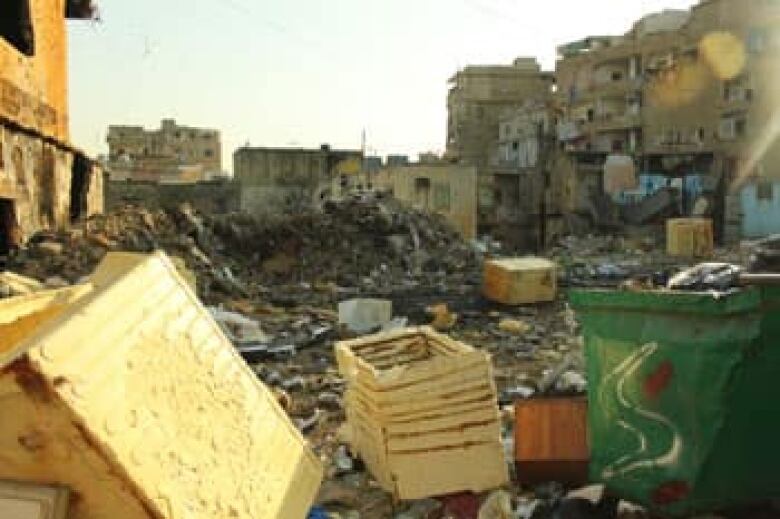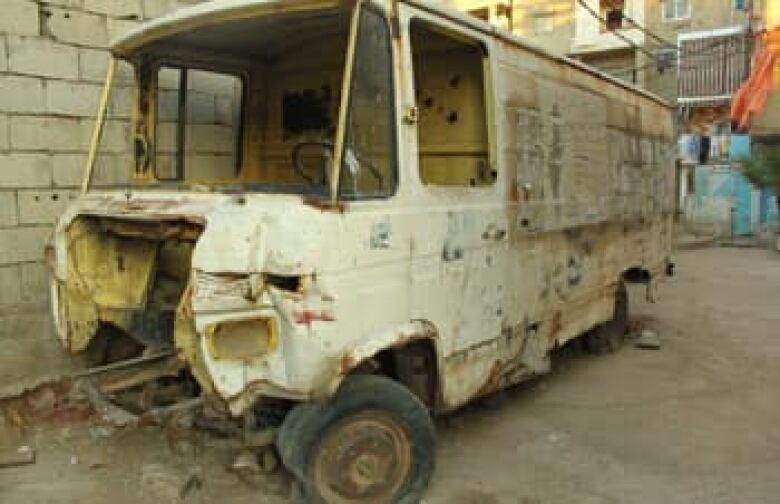DAY 7: A litany of woes
Nov. 10, 2010 I'd thought we'd already seen the worst of Shatila that is,until we walked toward one of its entrances to take some photos. There, rotting in the sun,sat a festering garbage dump just a few dozen metres from tenements housing hundreds, perhaps thousands, of people.
We're told there are six garbagemen in Shatila, employed by the United Nations to gather the refuse of some 12,000 residents. But it's not nearly enough. And nothing, it seems, could erase this unsightly garbage dump, except perhaps for one large bonfire.

Look anywhere, in any corner of Shatila, and there's evidence of a daunting problem waiting to be solved. There is the large water tank built at great expense to draw water from a well that's been sitting empty for months because, it turns out, the water below is unfit for human consumption.
Thereare heaps of rubble and debris and concrete blocks in many of the alleys and roads. It all just sits there, waiting to be picked up.
Nahlah Ayed's Shatila blog
- Day 1: En route to Beirut
- Day 2: Small signs of progress
- Day 3: Sharing details, but with dignity
- Day 4: Artifacts of exile
- Day 5: Shatila's space problem
- Day 6: Camp politics
- Day 7: A litany of woes
- Day 8: Talking about Arafat
- Day 9: Dreaming big in Shatila
- Day 10: Living with the trauma of camp life
- Day 11: Celebrating sacrifice in Shatila
- Day 12: Stuck in Shatila
The residents themselves could solve some of these problems and sometimes, when the will has been there, problems have been solved. But there are many other conundrums that are beyond the reach of even the most willing. Today, over the course of less than an hour, we got a sampling of some of them.
It was an intensely hot day. We were cooling off in the shade with some tea, waiting for our next appointment, when a man approached us and timidly started talking.
"You should look into the story of Palestinians here who have no identification papers," he said.
I had glimpsed the wiry man with the dark pupils and long eyelashes at the camp's children's centre a few days ago. From morning till night, he also mans what is known asthe "express," a tiny Lebanese-style refreshment stall that peddles coffee and tea near the only open space in Shatila. It was his tea we were drinking.

Most Palestinians in Shatila have no passports or papers to prove a nationality, but they at least have official identification that allows them, for example, to arrange travel or register at a university. The people the man was talking about have no such identification, and no one will issue it.
"Are you one of those people?" I asked him. He nodded, and began to tell his story.
Hewas a refugee displaced by the Six Day War of 1967 and wasn't recognized by the Lebanese authorities because he had travelled through several countries that didn't issue IDs to those who had Israeli identification documents.
He complained passionately about the impossibility of travel, the difficulty of accessing just about any available services without official ID.
Within minutes, two friends of his joined the conversation.
"There are no services here for the disabled," said one,who wasnearly toothless and had a white stubble. He said he had a disabled son at home.
"Sometimes, they start up something to help them. They gather money and do a few things. Then, they disappear."
The conversation ebbed and flowed, seamlessly flowing into predicaments as diverse as the camp'sdivided political leadership and the rising cost of living.

Back to the wiry man. He hadnow moved on tohow common, and sometimes public, drug use is in the camp and what that might one day do to his children.
"Let's say they [drug users] have a problem, and they can't help it, can't they do it indoors?" he said.
The men, now more animated, next complained about the lack of opportunities for their children, bemoaning the wasted efforts of many Shatila youth who pursue higher education only to find themselves unemployed or underemployed upon graduation.
One of the men went to fetch an example of such a person. Mojahed Abbas (whose father runs the children's centre and whom we met a few days ago) appeared.
It took Abbas six long years to earn a degree in marine engineering. He returned to Lebanon, but because of its restrictions on Palestinian employment in dozens of professions, he's never actually worked here in his field.
"There are doctors who walk around and beg here for money," said the near-toothless man.
It was a sobering conversation. The garbage dump no longer appears so daunting.
[IMAGEGALLERY galleryid=131 size=large]













_(720p).jpg)


 OFFICIAL HD MUSIC VIDEO.jpg)
.jpg)



























































































